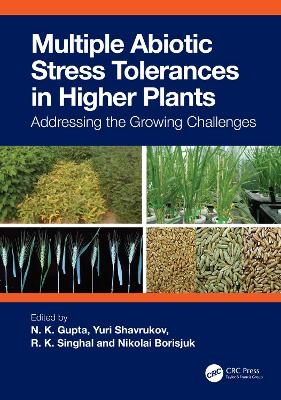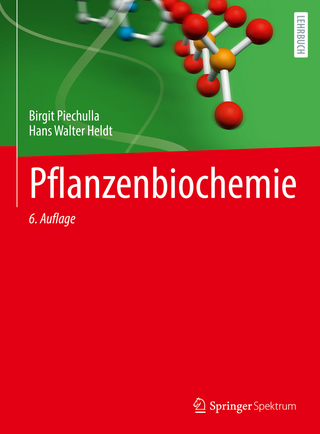
Multiple Abiotic Stress Tolerances in Higher Plants
CRC Press (Verlag)
978-1-032-29241-0 (ISBN)
In the last 50 years, classical breeding has played a significant role in achieving higher crop productivity, but major crops have reached a plateau in their yield potential. Therefore, the current focus for sustainable intensification of agriculture is the use of biotechnological approaches to enhance the yield potential by combating the yield losses that occur due to abiotic stresses. The abiotic stresses are governed by multigenes, and therefore, a holistic approach is needed to get success in imparting stress tolerance to enhance the yield potential of our crops.
Plants face multiple stress conditions during their life stages and adopt several physiological, biochemical, and molecular strategies to combat that, which are sometimes not sufficient to survive, particularly crop plants. The climate change era has created a need to understand the abiotic stresses in a holistic way. Therefore, a deep understanding of multiple abiotic stress mechanisms is necessary to develop crops tolerant to climate fluctuation.
With this background, the outline of this book covers the following features:
• Agriculture sustainability and molecular understanding of multiple stress tolerance
• Systems biology for life-history strategies, conventional and genomic approaches above and underground
• Genetic resources and molecular understanding of seed priming
• Molecular signaling compounds, cell signal transduction, and crosstalk between plant growth hormones and regulators
• Roles Transcription factors, LEA proteins, reactive oxygen species and alternative oxidase
• Genome editing, metabolomics, and ‘omics’ technologies
Dr. N.K. Gupta obtained his PhD (1997) from prestigious Indian Agricultural Research Institute, New Delhi, India. He was awarded Biotech Overseas Associateship (2006-2007) by Government of India and worked as Post Doc at University of Adelaide, Adelaide, Australia. He also served as Visiting Professor at the University of Nebreska, Lincoln, USA (2013) and University of Tottori, Japan (2023). At present he is working as Professor (Plant Physiology) & Director, Education at SKN Agriculture University, Jobner. Dr. Gupta has teaching experience of more than 25 years and guided 15 PG students for dissertation. He is Fellow of many academic societies. Recently he has been awarded prestigious J. J. Chinoy Gold Medal award by ISPP, New Delhi (2019). He is recipient of first RS Paroda Best Scientist Award (2020). He has published more than 60 research papers in national and international journals including Plant Cell Environment, Photosynthetica, Plant Growth Regulation, Journal of Agronomy & Crop Science, Functional & Integrative Genomics etc. He has four authored books and ten book chapters published by Nova Publication, CRC Press etc. His H-Factor is 18.0. Dr. Yuri Shavrukov received his PhD degree (1991) at the Institute of Cytology and Genetics, Russian Academy of Sciences, Novosibirsk. Russia, with following employment in the same Institute and combined his research with teaching at Novosibirsk State University.Hecompleted his STA Post-Doctoral Fellowship (1995-1996) at the Hokkaido National Agricultural Experiment Station (Japan); and was awarded JSPS Research Fellowship at the Hokkaido University (1998) and JSPS Senior Research Fellowship at Okayama University (2012). In 2001, Dr. Shavrukov was selected and employed by CSIRO (Commonwealth Scientific and Industrial Research Organisation), Adelaide, Australia. After CSIRO, he received a position at the University of Adelaide, Plant Genomics Centre (2005-2016), and since that he moved to Flinders University, Adelaide. Currently, Dr. Shavrukov is Adjunct Professor at the College of Science and Engineering (Biological Sciences), Flinders University. His H-factor is 22. He has more than 65 publications, and he is actively publishing especially in last years. Dr. R.K. Singhal is currently working as a scientist in the Division of Crop Improvement, ICAR-Indian Grassland and Fodder Research Institute, Jhansi (U.P) India. He has published more than 40 research reviews and chapter paper in reputed journals such as Frontier in Plant Science (IF-5.753), Frontier in Agronomy, Physiologia Plantarum (If-4.5), Plant Breeding, Russian Journal of Plant Physiology and many others focused mainly on abiotic stresses. Currently, he is working on multiple abiotic stress tolerance in different crops. Dr. Nikolai Borisjuk is a Professor at the School of Life Sciences of Huaiyin Normal University. He has graduated from the T. Shevchenko Kiev State University (Kiev, Ukraine), majoring in microbiology and received his PhD in molecular biology in 1988. In 1990 he moved to Tuebingen University in Germany as a fellow of A. von Humboldt foundation, and since then he continued working at various international research Institutions in Germany, USA and Australia. He has published more than 60 research papers devoted to plant genome structure and evolution, plant genetic engineering and stress resistance in prestigious scientific journals such as Nature Biotechnology, PNAS, Plant Physiology, New Phytologist etc. with a current H-factor of 27. He taught molecular biology and plant genetic engineering courses and supervised undergraduate and postgraduate students at the Kiev State University, Institute of Plant Genetics (Gatersleben, Germany), Rutgers University (New Brunswick, USA), Thomas Jefferson University (Philadelphia, USA) and the University of Adelaide (Adelaide, Australia).
1. Molecular Understanding of Multiple Stress Tolerance in Higher Plants: An Overview. 2. Systems Biology Approach Unfolds Unique Life-History Strategies in Response to Abiotic Stress Combinations. 3. Advances in Phenomics and its Implications for Crop Improvement under Multiple Stress Conditions Through Conventional and Genomic Approaches. 4. Improving Yield under Combined Salinity and Drought – Physiological and Molecular-Genetic Approaches. 5. Multiple Stresses Underground in Soil (Salinity and Sodicity). 6. Wild Barley Relatives - Potential Donors of Salinity Tolerance for Cereal Crops. 7. Rehabilitation and Management of Multiple Stresses in Saline and Sodic Soils for Agriculture Sustainability. 8. Reactive Oxygen Species and Alternative Oxidase in Multiple Stress Tolerance. 9. Molecular Understanding of Plant Growth Hormones and Plant Growth Regulators Crosstalk’s under Combined and Multiple Abiotic Stresses Tolerance. 10. Multifaceted Roles of Versatile LEA-II Proteins in Plants. 11. Molecular understanding of signaling compounds for optimizing cell signal transduction mechanism under abiotic stresses in crop plants. 12. Co-overexpression of Two or More Genes to Achieve Higher Tolerance to Single as well as Multiple Stresses in Plants: from Arabidopsis to Cotton. 13. Molecular Understanding of Transcription Factors Involved in Multiple Stress Tolerance in Plants. 14. Molecular Understanding of Seed Priming Approaches for Combined and Multiple Stresses Tolerance. 15. Genetic Resources of Potato with Tolerance to Elevated Temperature, Frost and Drought. 16. Metabolomics for plant stress amelioration: The Status of cereal crops. 17. Applications of “Omics” Technologies in Plant Responses to Combined Drought and Heat Stress: Trends and Future Perspectives. 18. Genome Editing for Multiple Stress Tolerance.
| Erscheinungsdatum | 05.10.2023 |
|---|---|
| Zusatzinfo | 32 Tables, black and white; 22 Line drawings, black and white; 5 Halftones, color; 5 Illustrations, color; 22 Illustrations, black and white |
| Verlagsort | London |
| Sprache | englisch |
| Maße | 178 x 254 mm |
| Gewicht | 740 g |
| Themenwelt | Naturwissenschaften ► Biologie ► Biochemie |
| Naturwissenschaften ► Biologie ► Botanik | |
| Naturwissenschaften ► Biologie ► Genetik / Molekularbiologie | |
| Weitere Fachgebiete ► Land- / Forstwirtschaft / Fischerei | |
| ISBN-10 | 1-032-29241-5 / 1032292415 |
| ISBN-13 | 978-1-032-29241-0 / 9781032292410 |
| Zustand | Neuware |
| Haben Sie eine Frage zum Produkt? |
aus dem Bereich


